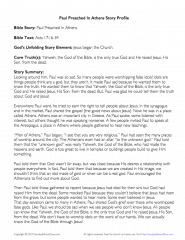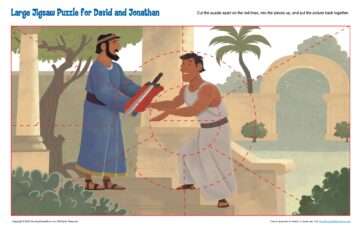Paul Preached In Athens Story Profile
This Paul Preached In Athens Story Profile provides a simple overview of the story (for kids) along with commentary, points of interest, and an approximate date for the Paul Preached In Athens story. A printable PDF for this profile is available here and all related activities are listed here.
Bible Story: Paul Preached In Athens
Bible Text: Acts 17:16-34
God’s Unfolding Story Element: Jesus began the Church.
Core Truth: Yahweh, the God of the Bible, is the only true God and He raised Jesus, His Son, from the dead.
Story Summary:
(Note: A teaching picture formatted for 11 X 17 and a teaching picture formatted for 8.5 X 11 are available on the site. This story summary is formatted and included with each teaching picture so it can be easily printed on the back of the desired teaching picture.)
Looking around him, Paul was so sad. So many people were worshipping false idols! Idols are things people think are a god, but they aren’t. It made Paul sad because he wanted them to know the truth. He wanted them to know that Yahweh, the God of the Bible, is the only true God and He raised Jesus, His Son, from the dead. But, Paul was glad he could tell them the truth about God and Jesus!
Everywhere Paul went, he tried to earn the right to tell people about Jesus. In the synagogue and in the market, Paul shared the gospel (the good news about Jesus). Now he was in a place called Athens. Athens was an important city in Greece. As Paul spoke, some listened with interest, but others thought he was speaking nonsense. A few people invited Paul to speak at the Areopagus, a place in Athens where people gathered to hear new teachings.
“Men of Athens,” Paul began, “I see that you are very religious.” Paul had seen the many places of worship around the city. The Athenians even had an altar “to the unknown god.” Paul told them that the “unknown god” was really Yahweh, the God of the Bible, who had made the heavens and earth. God is too great to live in temples or buildings people build to give Him something.
Paul told them that God wasn’t far away, but was close because He desires a relationship with people everywhere. In fact, Paul told them that because we are created in His image, we shouldn’t think that an idol made of gold or silver can be a real god. Paul encouraged the Athenians to find out more about God.
Then Paul told those gathered to repent because Jesus had died for their sins but God had raised Him from the dead. Some mocked Paul because they couldn’t believe that Jesus had risen from the grave, but some people wanted to hear more. Some even believed in Jesus. That day salvation came to many in Athens. Paul shared God’s grief over those who worshipped false gods. Like Paul, we should be sad when we see people who don’t know Jesus. All people can know that Yahweh, the God of the Bible, is the only true God and He raised Jesus, His Son, from the dead. We don’t have to worship idols or the work of our hands. We can actually know the God of the Bible through Jesus!
Commentary:
This story takes place on Paul’s second missionary journey. While Paul was in Athens (a major city in Greece), waiting for Silas and Timothy to arrive from Berea, he talked to people in the city about Jesus. His preaching created a lot of interest and before long he was invited to speak to the intellectual leaders at a place called the Areopagus. This was a place where philosophers and teachers would gather to talk about religion, philosophy, and new ideas. Paul spoke to the men and declared that the God who created all things is the only God there is and He doesn’t live in physical buildings. Now God calls people to believe in Jesus, His Son. Paul explained that God had raised Jesus from the dead. Some people rejected Paul’s message, but some believed and became followers of Jesus.
This story is often used as an example of how to do evangelism and it certainly has lessons we can learn about Paul’s evangelistic style in this context. The story, however, is not really about Paul’s style of evangelism. Luke is giving us a glimpse of the Greek intellectual culture present in much of the Greek world and certainly here in Athens. He also wants to demonstrate that the truth of God’s Kingdom is superior to the inadequate philosophies of the world.
Here the gospel is presented to wealthy intellectuals and philosophers who perceived themselves as somewhat superior to others as they had given themselves to spending their days in discussions and disputes over philosophical issues. Paul was, to many of them, a back woods bumpkin and a “pseudo-intellectual” (17:18) (someone who pretended to be smarter than he actually was).
In crafting the Book of Acts, Luke has been deliberate about showing us the spread of God’s Kingdom in the face of worldly forces that would stand against it. These forces have included geography, race, politics, and religion. In every case the Kingdom of God is able to overcome the various “kingdoms” of this world. Now Luke brings us to the challenge of certain philosophies which had influenced every aspect of Greek culture.
Paul’s message is designed to both disarm and challenge the predominant philosophies of Epicureanism and Stoicism. The sticking point for these people seemed to be the issue of Jesus’ resurrection. For Christians, this is an easy reality for us to accept. In the resurrection, the God of life (the God of the Old Testament) has conquered death itself (the consequence of sin in Gen. 3) and demonstrated that victory in Jesus’ resurrection. He is establishing a new creation and the resurrected Jesus is the beginning point of this REcreation. The resurrection is essential to our faith. God is sovereign over all things, including life and death. Non-believers, however, find this hard to swallow and often tend to dismiss it without any real consideration. That’s what happened here to “some” in Paul’s audience.
Paul would later write in 1 Corinthians that, “the message of the cross is foolishness to those who are perishing, but it is God’s power to us who are being saved. For it is written: I will destroy the wisdom of the wise, and I will set aside the understanding of the experts” (1 Cor. 1:18-19). One can easily imagine Paul thinking about his experience in Athens as he wrote those words.
There are many important truths that can be gleaned from this story, but when teaching children, this story should focus on the fact that the God of the Bible (Yahweh) is the only true God and that Jesus, His Son, has been raised from the dead by the power of God.
Point(s) of Interest:
- There’s a good deal of debate over whether or not Paul was successful in Athens and some believe Paul later regretted taking the approach he did here. The text does not indicate whether Paul felt he was successful or not.
- It’s possible that Paul was not outside at all as “The Areopagus” could also refer to an institutional court that might have been meeting in an indoor location.
- The Epicurean philosophers believed that God was distant and uninterested in human affairs. Paul’s statement in 17:27 that “He is not far from each one of us” (and other comments) would speak to this Epicurean belief.
- The Stoic would agree that God is in us and that “in Him we live and move and exist (v. 28), but Paul makes it clear that God is not the same as the world or things in the world (pantheism).
Approximate Date: It is difficult to say with certainty exactly when Paul was in Athens during his second missionary journey, but it likely was somewhere around 49 or 50 A.D.
- Related Activity Links:
- Evangelism ,
- Paul ,
- Grade School (Readers), Preschool (Non-readers) ,
- Paul Preached In Athens




